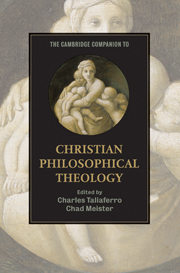2 - Necessity
from Part I - God
Published online by Cambridge University Press: 28 May 2010
Summary
Theories of divine necessity have had a checkered career. From Plotinus to Kant, it is hard to find a theist philosopher who considered the matter and denied one. In the dark night of post-Kantian Europe, it is hard to find a philosopher who considered the matter. Among twentieth-century analytic philosophers, one doctrine of divine necessity was once in such wide disrepute that J.N. Findlay could base on it a purported disproof of God's existence. Things have changed again: that same doctrine is now the consensus view among “analytic” theist philosophers. I speak of doctrines of divine necessity because the sentence “God exists necessarily” is multiply ambiguous. In what follows, I first sort out the ambiguities, then indicate why divine necessity has been so popular for so long. I then consider some arguments for and against the strongest doctrine of divine necessity.
- Type
- Chapter
- Information
- Publisher: Cambridge University PressPrint publication year: 2009
- 1
- Cited by

